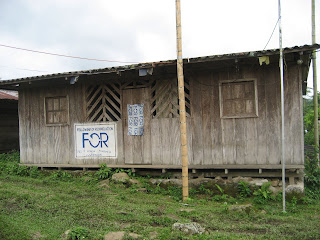 I became a godmother the other day (to the left is me with my new goddaughter, Karin Juliet, during the baptism mass, and below with my teammate Chris - the godfather - and the Karin's parents). During the joint baptism-Christmas mass, celebrated in the open-air community kiosko (gathering space), the priest described the particular advantage the 7 babies being baptised have over most other newly-baptised babies: while through baptism children are welcomed into the Christian community, these 7 babies are already part of an extraordinary community that exemplifies many of the best parts of Christianity: solidarity, mutual care, cooperation.
I became a godmother the other day (to the left is me with my new goddaughter, Karin Juliet, during the baptism mass, and below with my teammate Chris - the godfather - and the Karin's parents). During the joint baptism-Christmas mass, celebrated in the open-air community kiosko (gathering space), the priest described the particular advantage the 7 babies being baptised have over most other newly-baptised babies: while through baptism children are welcomed into the Christian community, these 7 babies are already part of an extraordinary community that exemplifies many of the best parts of Christianity: solidarity, mutual care, cooperation. I do see many of those values embodied here. In preparation for the 24th (Christmas Eve is the big day of celebration in Colombia, as opposed to the 25th in the U.S.), community members collaborated to prepare huge vats of the traditional Christmas food for the entire community – sancocho de res (a traditional stew made with a community-owned cow), natilla and buñuelos. And of course organizing the requisite baile (dance). I am proud to report I danced until 5am, though I was still bested by the strong few who danced until 7:30am! (I have earned a reputation as one of the top 2 or 3 dancers among FOR volunteers, which I find hilarious since at home I didn’t do much dancing, and when I did it was certainly not until dawn!)
I do see many of those values embodied here. In preparation for the 24th (Christmas Eve is the big day of celebration in Colombia, as opposed to the 25th in the U.S.), community members collaborated to prepare huge vats of the traditional Christmas food for the entire community – sancocho de res (a traditional stew made with a community-owned cow), natilla and buñuelos. And of course organizing the requisite baile (dance). I am proud to report I danced until 5am, though I was still bested by the strong few who danced until 7:30am! (I have earned a reputation as one of the top 2 or 3 dancers among FOR volunteers, which I find hilarious since at home I didn’t do much dancing, and when I did it was certainly not until dawn!)Talking with the priest before the mass, he mentioned how he comes to the community several times a year to perform baptisms. “I have to,” he said, “because this community produces so many babies. That’s how we know this community won’t be defeated, won’t be killed off: they keep reproducing!” he joked. And it's true: this morning the newest baby girl was born, just a few days ago my next-door neighbor gave birth to a little girl, and possible twins are expected in a couple of weeks – not to mention my goddaughter and the four other baby girls born in the last few months. A veritable baby boom!
The priest’s comments became especially poignant when, early Saturday morning, an older – though not elderly by any means – member of the community had a stroke and died. As I understand it, Perucho had been sick and in a lot of pain for a while, so some consolation can be taken in the fact that he’s no longer in pain. His body was lain out in the kiosko and community members took turns staying with his body night and day – drinking coffee and playing dominoes to stay awake – until his funeral yesterday morning.











